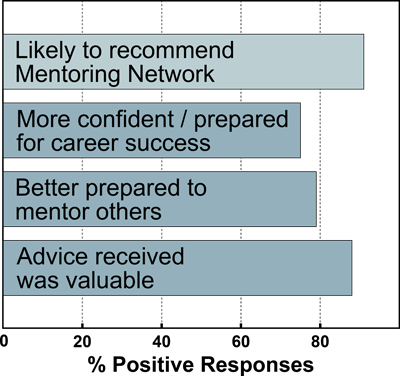Last year, AGU’s College of Fellows (COF) launched the Mentoring Network as part of its broader effort to foster excellence, integrity, and interdisciplinary collaboration across the organization. The Mentoring Network’s inaugural cohort consisted of six groups, each with six mentees and two senior scientists, who took part in monthly video chat meetings. Results from a recent mentee survey suggest that the Mentoring Network left a lasting mark on the early-career scientists.
Leslie Marasco, AGU Student and Diversity Program manager, expressed why making mentors available is so important: “Early-career scientists are often removed from their graduate school networks and have little funding. AGU wants to help by connecting early-career scientists to those with more experience, as well as to their peers, to share knowledge, experiences, and help build each other’s networks.”
Goal-Centered Approach
Each new group began with several kickoff meetings devoted to understanding mentee goals for the year. Mentors then crafted activities and group discussions centered on those goals. Mentors Julio Betancourt and John Farrington hit the ground running with a heady assignment on the first day. Betancourt recounts:
In our first virtual meeting, John and I gave our mentees license to think big and to see themselves in the realization of that vision. We asked them to identify serious gaps in their disciplines, mull over the value of integrated science, and anticipate advances in science and technology over the next decade. What roles could each of them play in promoting these advances and truly “moving the needle”? Have some ready answers, we urged, and you’ll nail your job interviews and get a head start on formulating research plans when you’re hired.
Evolution of the Group Dynamic
Meetings became more improvised as the year progressed. The groups reacted to developments in mentees’ personal or academic lives and encouraged perseverance during the job hunt. This structure allowed mentors to reinforce advice from earlier discussions while also giving specific tips on a variety of topics: generating good research ideas, networking, time management, balancing specialization with a broader perspective, and work-life balance.

Mentee Satisfaction
AGU sent a survey out to mentees after their participation in the Mentoring Network for 1 year. Quantitative results indicate a high level of mentee satisfaction (Figure 1). Respondents indicated no serious weaknesses in the program, although some did report slightly lower satisfaction with the clarity of the goals of the program and how mentors addressed networking opportunities.
Qualitative Survey Results
Open-ended survey responses indicate that mentees joined the program for guidance and support in four main areas of professional life:
- preparation for a current or future job search
- exposure to potential career paths
- improving research productivity and research quality
- managing early-career workloads and work-life balance
Responses also show that for the most part, mentees believed these topics were addressed in a beneficial way. What many valued most from the program was the ability to seek confidential advice from objective third parties—experienced professionals and peers alike. Mentees on the academic career track also valued mentor perspectives on the inner workings of the academic pantheon. Said one anonymous respondent,
There are so many small questions on how academia works, and when you don’t have people to turn to, it’s easy to stress about it. That stress can become overwhelming and leave you feeling like you don’t belong. These mentoring spaces are incredibly important.
Future Plans
The survey indicates that the Mentoring Network had a successful first year in terms of forging connections between early-career scientists and experienced professionals. The COF Mentoring Subcommittee is further enriching networking opportunities by scheduling back-to-back meetings for early-career scientists on Tuesday, 10 December, during AGU’s Fall Meeting 2019. The Macelwane Early Career and Student Breakfast and the ensuing Union session “A New Generation of Scientists” will offer students and early-career scientists the opportunity to engage with and learn from past and present Macelwane medalists.
AGU leadership intends for these additional networking activities to bolster existing efforts to make mentorship a core tenet of the organization’s broader mission. AGU president-elect Susan Lozier believes that programs such as the Mentoring Network are most effective when everyone has a voice in the process:
The biggest lesson that I learned from this pilot program is that we should fully engage the early-career scientists in the further development of this program….AGU is interested in understanding how we can make mentoring more accessible and more meaningful to early-career scientists, so we not only need their voices heard, we need their ideas to drive this program forward.
Natural Momentum
Survey responses and self-driven mentee initiatives suggest that momentum grows naturally from participation in such a program. The mentee survey was initiated in part by the mentees so they could share their experiences with program coordinators. In addition to personal enrichment, 79% of the mentees said they felt better prepared to transition into mentors, in part by sharing the wisdom they received from senior scientists in a Google doc accessible to all the mentoring groups. These outcomes indicate that the Mentoring Network’s impact will reach beyond its direct audience, and they show that scientists across all generations can play a vital role in strengthening the Earth and space science community by becoming active mentors.
—Kevin R. Roche ([email protected]), University of Notre Dame, Notre Dame, Ind.; Anita M. Marshall, University of Florida, Gainesville; Pablo Paiewonsky, State University of New York at Albany; Jing Yan, University of California, Merced; Logan Brenner, Barnard College, New York, N.Y.; and Sheila M. Saia, North Carolina State University, Raleigh
Citation:
Roche, K. R.,Marshall, A. M.,Paiewonsky, P.,Yan, J.,Brenner, L., and Saia, S. M. (2019), The value of early-career mentoring through AGU, Eos, 100, https://doi.org/10.1029/2019EO130127. Published on 02 August 2019.
Text © 2019. AGU. CC BY-NC-ND 3.0
Except where otherwise noted, images are subject to copyright. Any reuse without express permission from the copyright owner is prohibited.

